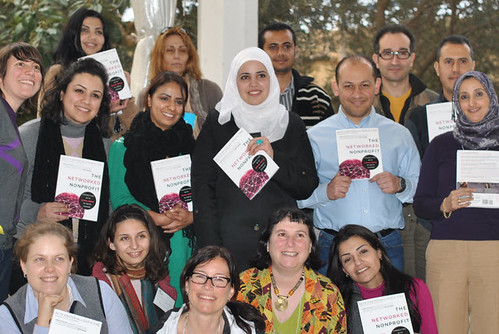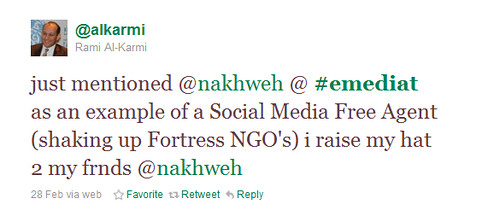
Beirut Diary: I’m in Beirut for the week as part of The E-Mediat project, a capacity building project that leverages a networked approach. I’m the lead for Zoetica where my role is to deliver training, advise on the curriculum and coaching methods, model transparency, and serve as meta network weaver. I have the honor of co-training with some of the best folks doing work in this part of the world.
The E-Mediat project is sponsored by MEPI, US Department of State’s Middle East Partnership Initiative and was created in response to Secretary Clinton’s announcement of Civil Society 2.0. The project is being managed by IIE and builds on a highly successful program launched in the Middle East five years ago, Women in Technology that trained over 10,000 women from 9 countries in the Middle East and in collaboration with over 60 training partners. A true public/private partnership, the funding partners include Microsoft and craiglist Charitable Fund.
We spent Day 2 of the E-Mediat Train the Trainer sessions on “Translating The Networked NGO in the Arab World.” The workshop was based on the concepts in The Networked Nonprofit, including listening, transparency, simplicity, social culture, and working with free agents. The specific learning objectives:
To understand the principles of “being” a Networked Nonprofit
To localize Networked Nonprofit concepts to an Arab NGO context, as appropriate, for improved project outcomes
To identify ways to integrate “translated” Networked Nonprofit principles into social media training/coaching, as appropriate
Each topic introduced a framework and story, and was followed by discussion and activities to identify examples in the Arab world and or determine whether the principle was relevant. In keeping with the theme of translation, I designed an icebreaker game called “Is There An Arabic Word for that?” It was inspired by a conversation we had during the planning sessions in San Francisco in January about whether or not there was an Arabic word for Nerd (there isn’t).
I took a series of screen shots from social media platforms and had the participants discuss and identify what the best Arabic phrase or word. It is interesting to note that not all people in Arab countries speak the same Arabic, there are many dialects. Most of the social media tools and tag lines did translate, although there isn’t specific Arabic concept or phrase for “user-generated content.”
I presented an overview of the Networked Nonprofit framework and shared three stories of networked nonprofits , including The Story of Stuff , Surfrider Foundation, and Pratham Books. Rami Al-Karmi, Founder and CEO of Shabakat, Al Ordon (JordanNet) and is serving as the E-Mediat Strategic Adviser for the Jordan In-Country Team shared some lessons about working as networked ngo. His organization’s name, Shabakat, translates into the word “network.”
Shabakat Al Ordon trains young people in technical, professional and facilitation skills who then go out and create programs to train people in their communities. Rami shared how his organization works in a transparent way, open sourcing its program materials and processes. They also work many different partners to spread the program so that his organization isn’t doing everything. They’ve simplified and focused on what they do best.
The Team from Tunisia identified Sawty as an example of a networked nonprofit in Tunisia, while the Lebanon Team pointed to Nasawiya. The Morocco Team discussed how Youth Without Borders is a networked network and the Yemen Team pointed out how the Youth Leadership Development Foundation is one as well. We had a conversation about areas of resistance to social media from NGOS which were very similar to those I’ve heard in the US and other parts of the world –
lack of time and not seeing the value of social media.
Costs Since it is free, they don’t want to spend additional money on it
Why do we need it? What is in it for us?
No time
Leadership isn’t open
NGOS that work like fortresses
We discussed ways to initiate organizational change to be more open to social media adoption in the context of training and coaching. There were many ideas, but all agreed sharing success stories from NGOs in their country was important.
The principles that resonated most: Changing Fortress NGOs to be more transparent and working with free agents. Lina Aleryani, Team Leader from Yemen, offered this reflection on her workshop blog during “laptop time.”
The concept of “a networked organization” compared to a fortress one spoke to me more than anything else, not only because I have seen in my work with many NGOs and CSOs how difficult for organizations to share information and work with others, but also it made me realize how this “ cultural behavior” is holding them back and undermining their work. The questions that are remain in my mind are:
What are the best practices for moving a fortress organization to a networked one, specifically in the Arab countries context? Transparency and “ Arab NGOs” can they go together?
Is there away that could make NGOs in the Arab World more transparent?
How can we identify “ free agents” and involve them in our work?

The participants were intrigued by the concept of Free Agents and the teams from Jordan and Lebanon discussed Free Agents in their countries. During “laptop time,” Diane Sabbagh, from the Lebanon Country Team wrote about Free Agents in her country, including the story of Rita Kamel who is raising awareness about breast cancer.The Jordan Team mentioned Nakhweh as a leading example of a NGO working with free agents.
We also covered some of the basic techniques for listening and engaging. We did an exercise to identify keywords and I demoed several tools. The Morocco Team blogged about two of the tools that were demoed, social mention and rowfeeder. We discovered that rowfeeder will scrape tweets written in Arabic!
At the end of the day, we did a reflection to identify ideas and insights that will be put into practice. Then it was time to distribute the gifts, including Flip Cameras and books. I then modeled creating a thank you video with each team sharing a few words about how they use the videos and saying thank you to Cisco and FLIP Camera in a fun way.
